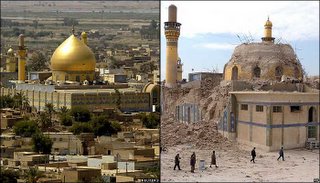Al-Aksari Shrine Destroyed in Samarra
Question: What's the difference between an insurgent and a terrorist?
Answer: This...

Early this morning, a group of terrorists blew up the al-Aksari shrine in Samarra, Iraq, one of the holiest shrines in Shia Islam. Now today, many people are wondering if this event will trigger a civil war in Iraq between Shia and Sunni. Shia Iraqis reacted angrily today, torching 29 Sunni mosques in Baghdad and murdering three Sunni imams. In Basra, Shia militias broke into a prison and took away ten Sunni militant prisoners whose dead bodies were later found tortured and riddled with bullets.
I had conversations today with three Iraqi friends of mine, all Sunnis, who spoke with a sense of nostalgia when they described the al-Aksari shrine. Driving from Mosul to Baghdad, they used to enjoy looking at it. The beautiful golden dome was visible from the road and served as a landmark that the car was almost in Baghdad. To the people of Samarra (a predominantly Sunni city), the golden dome probably had more nostalgic value, even for people who are not Shia. One does not have to be a Shia, or even a Muslim to appreciate the beauty of this building.
Which leads one to question whether any Iraqi in his right mind would blow up such a beautiful and historic building. This seems to suggest the attackers may be foreign terrorists who care little about Iraq's history and care more about the pursuit of their own goals.
The al-Aksari shrine bombing bears the hallmark of an al-Qaeda attack. In particular, the strategy behind the attack seems to be taken straight from the letter Zarqawi wrote to senior al-Qaeda leadership in 2004, and which was intercepted and published by the US. In that letter, Zarqawi describes Iraq's Shia majority as "the insurmountable obstacle, the lurking snake, the crafty and malicious scorpion, the spying enemy, and the penetrating venom." He outlined the following strategy on how to deal with Shia:
These in our opinion are the key to change. I mean that targeting and hitting them in [their] religious, political, and military depth will provoke them to show the Sunnis their rabies . and bare the teeth of the hidden rancor working in their breasts. If we succeed in dragging them into the arena of sectarian war, it will become possible to awaken the inattentive Sunnis as they feel imminent danger and annihilating death at the hands of these Sabeans.
In other words, Zarwaqi was suggesting the best way to solve the Shia problem was to provoke them into fighting back, to try to setup a larger sectarian conflict between Iraq's Sunni and Shia, so that the Sunni (who Zarqawi seems to figure as better fighters) would destroy the Shia.
This letter was written in 2004. Now, in 2006, Zarqawi, or someone following Zarqawi's game plan seems to have struck a decisive blow in the pursuit of its diabolical goal. Whoever blew up the al-Aksari shrine was trying to provoke a civil war between Sunni and Shia in Iraq.
The long-term result of today's destruction will really depend on how Sunni and Shia religious leaders in Iraq handle the situation. This attack will either provoke a major round of violence between Sunni and Shia, or may actually have the opposite effect, unifying the Iraq Sunni and Shia against the foreign terrorists who likely perpetrated this act.



<< Home